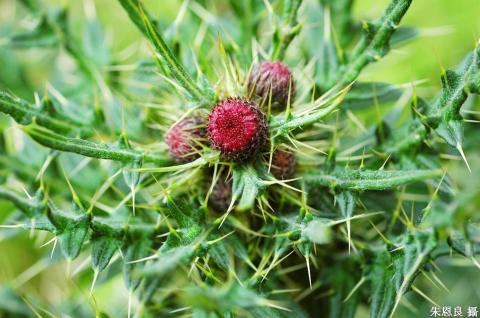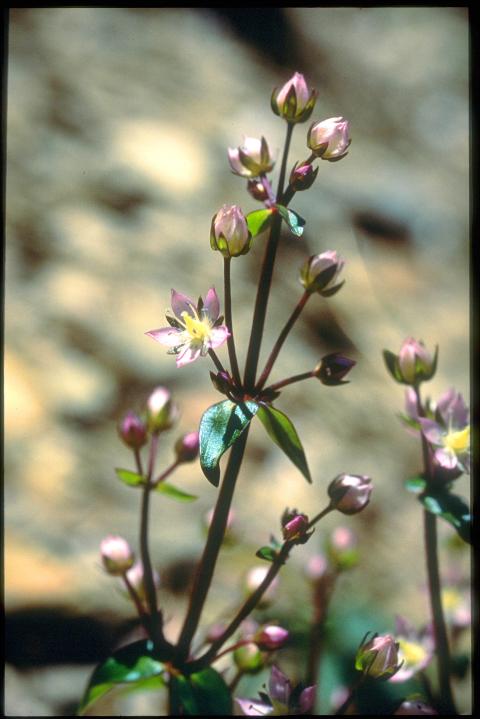At an international conference on Sept. 26, Academia Sinica academician Chou Chang-hung said that with the onset of global warming, wild plant species at average to high altitudes have been showing a tendency to migrate to higher altitudes, adding that if these species continue to migrate they will eventually reach a point where there is nowhere to grow. Chou says that six plant species indigenous to Taiwan, including Yushan’s Hypericum nagasawai, will soon face extinction, and says that the preservation of genetic resources brooks no delay.
The Taiwan Endemic Species Research Institute (TESRI) under the Council of Agriculture held the International Conference on the Collection and Preservation of Plant Genetic Resources on Sept. 26, with Peter H. Raven, a former science consultant for the Clinton administration and longtime director of the Missouri Botanical Garden, around a dozen other international experts from South Africa, England, Germany and China, as well as Academia Sinica’s Chou, Lee Chia-wei, a professor in National Ching Hua University’s Department of Life Sciences, and Chiu Chi-jung and Chung Kuo-fang, both professors in National Taiwan University’s School of Forestry and Resource Conservation, presenting papers at the conference.
Chou says research shows that from 1906 to 2006 plant life at average to high altitudes in the Hehuanshan area gradually migrated to higher altitudes due to global warming, averaging 3.6m per year. If this migration trend is not slowed down, there will eventually be no more land available for the plants to grow, meaning that at least six of Taiwan’s native plant species — Anaphalis morrisonicola, Artemisia morrisonensis, Swertia randaiensis, Hypericum nagasawai, Angelica morrisonicola, and Cirsium arisanensis — potentially face extinction.

Photo courtesy of the Endemic Species Research Institute
照片由特有生物研究保育中心提供
TESRI director Tang Hsiao-yu says that they are currently in the process of planning facilities for the preservation of plant species in high-altitude mountain areas. Still at the preliminary phase of planning, they have decided to create a preservation area at Hehuanshan and will be working to collect and preserve 500 or so of the plant genetic resources currently growing at high altitudes there. With enough manpower and funding, the institute hopes to expand its collection and preservation endeavors to Southeast Asia in the future, potentially benefiting their work by holding exchanges with international experts and learning from the experiences of others, Tang says.
(Liberty Times, Translated by Kyle Jeffcoat)
全球氣候暖化,中高海拔野生植物出現往高海拔地區遷移生長的趨勢,中研院院士周昌弘九月二十六日在一場國際研討會中提出警訊,強調若高山植物持續往高處遷移,未來將無處可去,而台灣特有種的玉山金絲桃等六種植物恐將絕滅,種原蒐藏保育已刻不容緩。

Photo courtesy of the Endemic Species Research Institute
照片由特有生物研究保育中心提供
農委會特有生物研究保育中心二十六日舉辦植物種原蒐集與保育國際研討會,包括曾任美國前總統柯林頓科學顧問的密蘇里植物園園長彼得‧雷文與來自南非、英國、德國與中國等十二名國際專家學者與中研院院士周昌弘、清大生命科學系教授李家維與台大森林資源系教授邱圻榮、鍾國芳均與會發表報告。
周昌弘指出,從一九○六至二○○六年之間在氣候暖化影響下,研究紀錄顯示在合歡山區的中高海拔野生植物,每年以三點六公尺速率往高海拔遷移生長,若此趨勢未見減緩,最後將無處可去,其中至少有玉山抱莖籟簫、細葉山艾、巒大當藥、玉山金絲桃、玉山當歸與阿里山薊等六種植物極可能面臨絕滅。
特生中心主任湯曉虞表示,目前正積極籌設高山植物種原保存設施,初步選定合歡山地區設立保存場地,就現有五百多種高山植物種原進行蒐藏保存,未來若人力、財力允許更將擴展蒐藏範圍至東南亞地區,藉著國外學者專家的經驗交流,有助推動種原保存工作。
(自由時報記者陳信仁)

For many introverts, shy individuals and people with social anxiety, mingling at parties is often draining or arouses uncomfortable emotions. The internal debate about whether or not to attend large get-togethers can get especially intense during the holiday season, a time when many workplaces celebrate with cocktail hours, gift exchanges and other forms of organized fun. “Some people are just not party people,” City University of New York social work professor Laura MacLeod said. “With a workplace holiday party, there’s a pressure to be very happy and excited. It’s the end of the year, it’s the holidays, we’re all feeling grand.

Facing relentless flooding and rising expenses, Dumble Farm in England has stopped selling milk and started an unexpected but therapeutic venture: cow cuddles. In 2022, the owners sold most of their dairy cows and began letting visitors spend time brushing, petting, and even hugging specially trained Highland cows for 95 pounds per session. This unusual shift reflects the rise of the so-called healing economy, a sector where animal-assisted experiences are marketed as emotional remedies for stress and burnout. While dogs and cats remain the most common therapy animals, cows are gaining popularity for their calm nature. At Dumble Farm, only cows that

Twelve dinner guests have just left your house, and now a tower of greasy plates stares back at you mockingly. Your hands are already wrinkling as you think about scrubbing each dish by hand. This nightmare bothered households for centuries until inventors in the 19th century tried to solve the problem. The first mechanical dishwashers, created in the 1850s, were wooden machines with hand cranks that splashed water over dishes. Unfortunately, these early devices were unreliable and often damaged delicate items. The real breakthrough came in the 1880s thanks to Josephine Cochrane, a wealthy American socialite. According to her own account,

對話 Dialogue 清清:你看到小陳最近發的滑雪照了嗎?看起來真帥氣。 Qīngqing: Nǐ kàndào Xiǎo Chén zuìjìn fā de huáxuě zhào le ma? Kàn qǐlái zhēn shuàiqì. 華華:感覺滑雪很好玩。看了他的照片以後,我在想要不要去學滑雪。 Huáhua: Gǎnjué huáxuě hěn hǎowán. Kàn le tā de zhàopiàn yǐhòu, wǒ zài xiǎng yào bú yào qù xué huáxuě. 清清:我聽說報名滑雪教室的話,會有教練帶你練習。 Qīngqing: Wǒ tīngshuō bàomíng huáxuě jiàoshì de huà, huì yǒu jiàoliàn dài nǐ liànxí. 華華:可是我有點怕摔倒,而且裝備好像不便宜。 Huáhua: Kěshì wǒ yǒudiǎn pà shuāidǎo, érqiě huāngbèi hǎoxiàng bù piányí. 清清:剛開始一定會摔啊,不過可以先上初級課程,比較安全。 Qīngqing: Gāng kāishǐ yídìng huì shuāi a, búguò kěyǐ xiān shàng chūjí kèchéng, bǐjiào ānquán. 華華:說的也是。那你呢?你想不想一起去? Huáhua: Shuō de yěshì. Nà nǐ ne? Nǐ xiǎng bù xiǎng yìqǐ qù? 清清:我想加一!我們可以先找找看哪裡有教練和適合初學者的課程。 Qīngqing: Wǒ xiǎng jiā yī! Wǒmen kěyǐ xiān zhǎo zhǎo kàn nǎlǐ yǒu jiàoliàn hàn shìhé